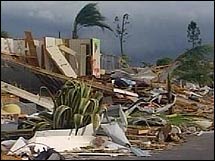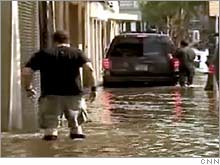Rocking like a hurricaneInsurers hiked rates, but this year's storms never came. Ka-ching! Fortune's Andy Serwer reports.(Fortune Magazine) -- As I write this column in the third week of October, not a single hurricane has made landfall in the eastern U.S. this summer or fall. It's still possible that a major storm will plow through the Gulf, but getting less likely every day: Hurricane season ends on Nov. 30. So it now appears that the oh-so-feared hurricane season of 2006 will end up a complete bust. That's great news for everyone from grandmas in Boca Raton to shrimpers in Mobile to giant insurance companies - especially to giant insurance companies. They're minting money right now.
Take Allstate (Charts), one of the nation's largest insurers of homes and autos, which reported blowout earnings the other day. The company made $1.16 billion in the third quarter, compared with a loss of $1.55 billion in Q3 of 2005. For the year, Merrill Lynch estimates that Allstate will earn $7.30 a share, up from $2.35 in 2005 (which was down 47 percent from 2004). Why? Allstate and others have jacked up rates on the Atlantic Coast between 50 percent and 100 percent, or in many cases declined coverage entirely. Allstate CEO Ed Liddy makes no apologies. "This is a local business," he says. "Folks in Iowa don't pay for the people who live in Florida. Rates were too low for these fabulous homes in harm's way. Now we can see that, for years, rates in these coastal regions have been inadequate." Inadequate rates produce inadequate returns for shareholders. But extreme events give the insurers an opening to raise prices and reduce risk. Allstate's stock is up 15 percent this year. So now we hear all sorts of bellyaching about the way Allstate and its rivals are ripping off everyone from folks with million-dollar beach homes to coastal working stiffs. As a homeowner, you might think that increases in insurance premiums are a nasty thing. But if state regulators had allowed for bigger annual rate hikes along the way, there might be less pain now. Mother Nature pulls a fast one The expectations for this year's hurricane season were so dire because folks extrapolated from 2004's and especially 2005's extraordinary storms. (And it's not all about Katrina; eight major hurricanes hit Florida over the past two years.) Prognosticators tell us that we entered an era in which powerful storms would roar out of the Caribbean and crash into the U.S. with increasing regularity. They point to wind and weather-pattern studies to prove it and invoke the specter of global warming. In response, hedge funds bid up oil and natural gas prices this fall. But when the storms failed to materialize, prices crashed and so did some of those funds, most notably Amaranth. Weather forecasters geared up for a stormy autumn as well. My CNN colleague, severe-weather expert Chad Myers, told me that the network bought new equipment such as fancy GPS locators and a dedicated Google Earth computer. "Now it looks as if all that whiz-bang stuff will go into hibernation until next May," he says. Okay, but, Chad, why weren't there any hurricanes this year? "Actually, the season started out looking kind of scary," he told me. "We were in a La Niña wind pattern, which enhances hurricanes. Then in May and June, the winds flipped to an El Niño pattern. We've had storms since, but they've all been gutter balls pushed out to the middle of the Atlantic Ocean." The only mistake worse than overreacting to the past two years would be to drop our guard now. Both Chad Myers and Ed Liddy believe that long-term weather patterns do suggest more rather than fewer hurricanes over the next decade or so, and that this year is an aberration. And in any event, there are always other disasters to worry about. "El Niño brings heavy rains and flooding to California," Chad tells me. "The rain causes prodigious vegetation growth in the mountains, which later dries out and becomes fuel for an extra bad forest fire season next year." Watch for insurance premiums to spike out West. ________________________ Allstate profits up on easy hurricane season U.S. insurers are jacking rates, canceling policies and learning to cope with climate change |
|


